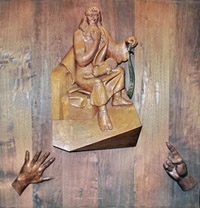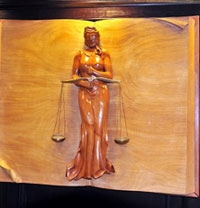History
When Mobile County became a part of the United States, a five member "County Court" was established, and the Judge of Probate was the presiding officer of the County Court. This court, like its counterparts in most other Southern states, was also the chief administrative and legislative body in the county and an inferior court with limited civil and criminal jurisdiction. In 1821, the composition of the County Court was changed from five justices and a clerk to one "County Judge" and a clerk. At the same time, a separate "Court of County Commissioners" was established, consisting of four commissioners and the County Judge. This arrangement provided for some separation of the judicial function from the administrative and legislative function at the county level. The County Court was vested mainly with the same judicial powers of its predecessor, and the County Judge was assigned the same powers formerly exercised by the chief justice of the former inferior County Court. The administrative and legislative functions, such as control over roads, bridges, ferries and the management of public buildings were assigned to the new Court of County Commissioners.
In 1850, a court of probate, as we know it today, was established in each Alabama county. The positions of clerk and judge of the County Court were consolidated into an office of "Judge of Probate." Unlike the County Judge who was appointed for a six year term, the Judge of Probate was to be popularly elected for a term of six years. Jurisdiction of the former County Court was for the most part transferred to the Probate Court, the major exception being civil and criminal jurisdiction, neither of which were vested in the new Probate Court. The Judge of Probate was given the authority formerly exercised by the County Judge and Clerk of the County Court, with authority to appoint his own clerk. Like his predecessor, the Judge of Probate was made a member of the Court of County Commissioners. At one time, the Judge of Probate had jurisdiction over juvenile, welfare, desertion, and non-support cases and matters. As time progressed, these duties and responsibilities were transferred to other courts and governmental entities.
As Mobile County grew and became the second most populous county in Alabama, the duties and responsibilities of the Mobile County Judge of Probate were augmented. The Judge of Probate ceased serving as chairman of the Court of County Commissioners (now called the Mobile County Commission) and the jurisdiction of the Mobile County Judge of Probate was expanded to enable the Mobile County Probate Court to hear and rule upon some judicial matters that were being heard by judges of the Circuit Courts. As these changes occurred, it was recognized that a person "learned in the law" should serve as Judge of Probate, consistent with requirements relating to judges of the Circuit Court. Baldwin, Bibb, Houston, Jefferson, Marengo, Mobile, Montgomery, Pickens, Shelby, and Walker Counties are the only ten counties in the State of Alabama where it is required that the Judge of Probate be licensed to practice law. Further, in a number of Alabama counties today, the Judge of Probate continues to serve as chairperson of said counties' board of commissioners.
Previous Judges of Probate (and Presiding Judges of County Court)
| Name | Years Served | Title | |
|---|---|---|---|
| Josiah Blakeley | 1813 | Chief Justice of the County Court | |
| John Hinson (Henson) | 1814 | Chief Justice of the County Court | |
| Alvin Robeshow (Robeshaw) | 1816 | Chief Justice of the County Court | |
| Henry Vassal Chamberlain | 1819 | Chief Justice of the County Court | |
| Cyrus Sibley | 1820 | Chief Justice of the County Court | |
| Thomas Murray | 1821 - 1822 | ||
| William Hale | 1823 - 1832 | ||
| William Mallory Garrow | 1833 - 1836 | ||
| John Fagan Everett | 1837 - 1842 | ||
| George F. Lindsay | 1842 | ||
| John A. Cuthbert | 1843 - 1848 | ||
| Joseph Seawell | 1848 - 1850 | ||
| Edwin Rust | 1851 - 1854 | ||
| Alexander B. Meek | 1854 - 1855 | ||
| Jonathan A. Hitchcock | 1855 - 1860 | ||
| George W. Bond | 1861 - 1868 | ||
| Admiral Raphael Semmes | 1867 | **HISTORY NOTE! Former Confederate States of America Admiral, RAPHAEL SEMMES was elected Judge of Probate in 1867 ... But Federal Authorities WOULD NOT PERMIT HIM TO SERVE! | |
| Gustavus Horton | 1867 - 1873 | ||
| Price Williams, Jr. | 1874 - 1914 | ||
| Price Williams | 1915 - 1937 | ||
| Matthew A. Boykin | 1937 - 1940 | ||
| Norvelle R. Leigh, Jr. | 1940 - 1950 | ||
| William C. Taylor | 1950 | ||
| Walter F. Gaillard | 1950 - 1954 | ||
| T. L. Griffin | 1954 - 1956 | ||
| Vernol R. Jansen | 1956 - 1963 | ||
| John L. Moore, III | 1963 - 1982 | ||
| L. W. “Red” Noonan | 1983 - 2001 | ||
| Don Davis | 2001 - 2025 | ||
| C. Mark Erwin | 2025 - Present |
In this Section


